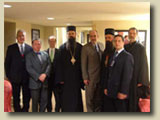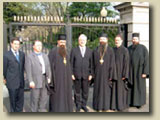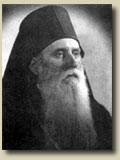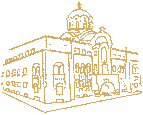|
|
Information
Service of
the Serbian Orthodox Church
April 10,
2005

SERBIAN
ORTHODOX CHURCH DELEGATION VISITS THE WHITE HOUSE
 On
Friday, April 8, 2005 the official Serbian Orthodox Church delegation
to the United States met yesterday (Friday) in the White House
with Dr. Jack D. Crouch, one of president George Bush's advisors
on national security; ambassador Dan Fried, who will soon be assuming
the duties of advisor to the US president for southeastern European
affairs, and Bertram Brown, the director of the National Security
Council for southeastern Europe. This meeting was very important
because these are individuals directly advising president Bush
on Balkan issues. The meeting was also attended by Serbia and
Montenegro ambassador Ivan Vujacic and our embassy in Washington
contributed significantly to the organization of meetings of the
Serbian Orthodox Church delegation in Washington. On
Friday, April 8, 2005 the official Serbian Orthodox Church delegation
to the United States met yesterday (Friday) in the White House
with Dr. Jack D. Crouch, one of president George Bush's advisors
on national security; ambassador Dan Fried, who will soon be assuming
the duties of advisor to the US president for southeastern European
affairs, and Bertram Brown, the director of the National Security
Council for southeastern Europe. This meeting was very important
because these are individuals directly advising president Bush
on Balkan issues. The meeting was also attended by Serbia and
Montenegro ambassador Ivan Vujacic and our embassy in Washington
contributed significantly to the organization of meetings of the
Serbian Orthodox Church delegation in Washington.
The
meeting was also to have been attended by Stephen Hadley, the
chief advisor to the US president on national security with the
president himself to appear at the meeting and speak briefly with
the delegation. However, due to the urgent departure to Rome to
attend the funeral of Pope John Paul II president Bush and Mr.
Hadley were unable to meet with the delegation.
At the beginning of the discussion Mr. Fried expressed the strong
support of the US administration for the efforts of the Serbian
Orthodox Church delegation during the course of its mission to
the United States. He also emphasized that Washington respects
the fact that the Serbian Orthodox Church has resolved the crisis
that ensued with respect to the restoration of destroyed churches
and monasteries in Kosovo and Metohija, and expressed the wish
that the restoration process begins as soon as possible in accordance
with the memorandum signed by Patriarch Pavle on behalf of the
Holy Synod of Bishops. Mr. Fried said that the US wants a multiethnic
Kosovo and opposes every form of nationalism. In this process
the White House sees the role of the Serbian Orthodox Church,
which enjoys great respect among the people, as very significant.
 Bishop
Grigorije explained that the Church by its nature cannot be nationalistic
because its mission transcends ethnic and political borders. "The
Church supports dialogue, not closedness and isolation,"
explained the Bishop. He added that "the Church cannot concern
itself with political issues such as the future status of Kosovo
and its political organization; however, it feels great responsibility
with respect to the survival of endangered people, their human
and religious rights, and the restoration of destroyed holy shrines". Bishop
Grigorije explained that the Church by its nature cannot be nationalistic
because its mission transcends ethnic and political borders. "The
Church supports dialogue, not closedness and isolation,"
explained the Bishop. He added that "the Church cannot concern
itself with political issues such as the future status of Kosovo
and its political organization; however, it feels great responsibility
with respect to the survival of endangered people, their human
and religious rights, and the restoration of destroyed holy shrines".
Later in his commentary Bishop Grigorije again emphasized the
importance of the restitution of confiscated church property,
as well as the urgent resolution of property issues with full
protection for privately owned Serbian property, which would send
a strong signal to refugees to return to Kosovo and Metohija.
He explained to his collocutors that since the beginning the Serbian
Orthodox Church established active dialogue but that the tragic
events of March 2004 resulted in great lack of confidence since
Kosovo and Metohija are increasingly becoming ethnically pure
Albanian territories. That is the very reason why the Serbian
Orthodox Church felt it necessary to re-examine whether further
dialogue would be useful. Nevertheless, His Holiness the Serbian
Patriarch and the Holy Synod of Bishops concluded that dialogue
should be intensified, especially with respect to the US, whose
troops during the March riots played a key role in preventing
even more wide-spread violence and destruction.
Mr. Fried explained that March 17, 2004 was "a great tragedy
and a lesson for all" but that since then KFOR has undertaken
significant measures to increase the level of battle readiness
in the event of new disturbances. He explained that the White
House sees great importance in the Serbian cultural heritage in
Kosovo, and that the Serbian Orthodox church has great moral potential
to be an active and constructive partner in the dialogue process,
as well as in achieving a unified position among Serbian politicians
in Kosovo. He explained that the international community will
be assessing standards in the coming six to eight months and that,
if the assessment is positive, they will initiate discussion on
the final status of Kosovo. "Your voice is important because
it tells us what is necessary to the Serbs, their Church and cultural
heritage in order to survive," said Fried. He added that
"the Serbian people and Church will enjoy protection with
all international guarantees regardless of future status".
He called on the Serbian Orthodox Church to define what the Church
needs as soon as possible but also to advise Serbian political
representatives in formulating a model of decentralization that
will give Serbs "more power at the local level".
Hieromonk Irinej Dobrijevic presented the proposal that the return
of Serbian refugees be intensified primarily to those areas where
holy shrines are to be restored or where they already exist, and
that Serbs are actively engaged in the restoration process. He
emphasized that this certainly did not represent any form of "colonization"
as tendentiously portrayed by some Kosovo Albanian media but the
return of Serbs to their own homes and their privately owned property
near churches and monasteries where they will feel stronger spiritually.
Bishop Teodosije explained to the collocutors that even during
the war the Church had a constructive position and clearly polarized
against violence, receiving all refugees, including Albanians,
into its monasteries. He also emphasized the painful fact that
almost all urban centers in Kosovo and Metohija have become monoethnic
since June 1999, and consequently that returns need to be made
possible not only to rural settings but also to the cities. He
emphasized the example of Prizren where the 30 remaining Serbs
who were expelled from their homes on March 17 still have not
been able to return to their homes. As well, despite partial restoration
of destroyed and damaged homes, there have been no returns to
Gnjilane and Obilic because people do not feel safe since the
perpetrators of the March violence and other crimes still have
not been found.
Bishop Grigorije added to the discussion that in Bosnia and Herzegovina
refugee returns are progressing much more easily to those areas
where there are compact ethnic groups because people feel more
secure there. In order to enable the integration of the population,
economic factors such as commerce and the development of the economy
may play a key role. "In Bosnia and Herzegovina the initial
territorial division into entities enabled the preservation of
communities; however, this isolation between people is not supposed
to last forever but to be transcended through a reconciliation
process. Nevertheless, until conditions are created for a normal
life, there should be no experimentation with attempts to annul
the entities since they are the guarantors of an equilibrium established
with great effort," explained Bishop Grigorije.
Bishop Teodosije also pointed out the problem that economic assistance
in Kosovo and Metohija largely went to the Albanians. "Funds
for many projects were received which were described as multiethnic
even though Serbs have no real possibility of participating or
deriving any sort of benefit from them. On the other hand, the
Albanian community has on numerous occasions blocked the building
of schools and infrastructure in Serbian enclaves by complaining
that these were monoethnic projects. This problem has led the
Serbian community to the brink of economic ruin, which not only
hinders return but threatens the survival of those who still remain
in their homes, especially young people who do not see any sort
of economic prospects here," said the Bishop. "Moreover,
we are still witness to armed provocations and physical attacks
which only further discourage the Serbs," he said.
The White House advisors thanked the Serbian Orthodox Church delegation
for its constructive analysis of the situation and its proposals.
Emphasis was placed on the need to remain in constant contract
through the embassy in Belgrade and the US office in Pristina.
At the conclusion of the meeting Mr. Crouch encouraged the delegation
by saying that the role of the Serbs in negotiations on Kosovo
will be very important and that in this process they will have
enjoy great support from the international community, especially
the USA.
The Serbian Orthodox Church delegation is leaving today for Chicago,
where it will make important contacts with representatives of
the Serbian diaspora. On Tuesday, April 13, the delegation will
return to the US capital, where it is scheduled to meet with congressional
representatives and other US officials. The return of the Delegation
to Belgrade is scheduled for April 16.

MEMORIAL
SERVICE HELD FOR FORMER BISHOPS OF BACKA
 On
Saturday, April 9, 2005, His Grace Bishop Irinej of Backa served
a memorial service for Bishops Jovan Jovanovic (1786-1805) and
Irinej Ciric (1922-1955) of blessed repose as part of the commemoration
of the two hundred year anniversary of the repose of Bishop Jovan
and the 50 year anniversary of the repose of Bishop Irinej. On
Saturday, April 9, 2005, His Grace Bishop Irinej of Backa served
a memorial service for Bishops Jovan Jovanovic (1786-1805) and
Irinej Ciric (1922-1955) of blessed repose as part of the commemoration
of the two hundred year anniversary of the repose of Bishop Jovan
and the 50 year anniversary of the repose of Bishop Irinej.
In
his homily Bishop Irinej emphasized the importance and greatness
of these figures in the life of our holy Church.
From
the Office of the Bishop of Backa

MEETING
OF THE DIOCESE COUNCIL AND ADMINISTRATIVE BOARD OF THE DIOCESE
OF BUDIMLJE AND NIKSIC
On
Saturday, April 9, 2005, in the monastery of Djurdjevi Stupovi
(Berane) the regular meeting of the Diocese Council and the Administrative
Board of the Diocese of Budimlje and Niksic was held and chaired
by Bishop Joanikije of Budimlje and Niksic. At this meeting the
final budget for 2004 was adopted as well as the proposed budget
for 2005 for the aforementioned Diocese. The Council and the Board
were pleased to conclude that spiritual life in the Diocese is
progressing and that the faithful are increasingly helping their
Church, actively participating in the restoration of holy shrines
and all spiritual events organized by the Diocese and its various
bodies.
During
the course of 2004 four churches were consecrated in the Diocese,
two priests were organized, and a total of eight monks and nuns
were tonsured. Monastic life was renewed in the monastery of Podvrh,
and presently 38 churches and parish homes are being built or
restored throughout the Diocese.
The
Diocese of Budimlje and Niksic calls on the highest government
officials in Montenegro to initiate as quickly and responsibly
as possible the regulation of relations between the State and
the canonical Orthodox Church in Montenegro on a judicial and
legislative foundation and in accordance with European standards.
This is the only way to resolve the numerous accumulated problems
in those relations and to transcend detrimental disagreements
on a daily basis. This foresees the passing of a law on the restitution
of illegally confiscated property to the Church, reaching an agreement
on mutual relations between Church and State, the return of the
rights of children to religious education in schools, and legal
protection of identity and names, property rights and religious
freedoms to the canonical Serbian Orthodox Church in Montenegro
recognized by all.
The
aforementioned administrative bodies of the Diocese of Budimlje
and Niksic expressed their utmost concern because of the subversion
of the Serbian language in Montenegro, and a state campaign of
terror against the conscientious and brave professors of secondary
schools in Niksic and Herceg Novi who sacrificed their livelihood
for the defense of the scientific truth and honor of all those
who inherited the Serbian language as one of their prime values
from their fathers.
The
members of the Council and the Board of the Diocese of Budimlje
and Niksic extended their most sincere greetings to all faithful
and to their associates and donors to the Diocese with the wish
that they may celebrate the greatest of Christian holidays in
peace and full Paschal radiance.
INFORMATION
SERVICE OF THE DIOCESE OF BUDIMLJE AND NIKSIC

[Serbian
Translation Services]

Copyright © 1999-2004 by
The Information Service of the Serbian Orthodox Church
11000 Belgrade
Kralja Petra I no.5
+381 11 3282 596
e-mail
|

